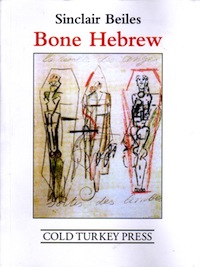A long-awaited copy of Bone Hebrew from Cold Turkey Press showed up in my mailbox. The title is taken from Paul Celan. The cover is by Antonin Artaud. The poems are by Sinclair Beiles. Here are two of them:
They tried every kind of gas on him.
none of them would work.
nothing would knock him out, put an
end to him, finish him off
so finally they called it a day
and let him free.
known as the pest, he wanders
freely about the village.THE WHITE KAFFIR SPEAKS
I am a white kaffir.
I know the soupe populaire at Odeon
And the piss smells of Anafiotika.
I have been a pavement artist in London
And was woken at six in the morning in Istanbul
By cops who wanted to examine my papers.
I have been steered out of hotel foyers by irate doormen
And have lugged carcasses into ships in New Zealand
Cursed out by the foreman.
Because I am articulate I have been treated as an interesting item.
“For tea, yes. For more than that with my daughter. No.”
I have been jailed for uttering the poetry of human love,
fingerprinted, photographed,
And crossed many borders illegally.
And I have stealthily entered into the backyard of a house
And drunk from the watertap because there was no fountain about.
Tyrannised by the proprietor I have washed dishes in Hampstead
And have had a charitable meal alone in a kitchen while the
Proprietor of the house ate in the dining room.
I have moonlighted frequently
And walked the streets all night carrying a heavy suitcase to an erstwhile friend.
I have looked forward to getting high on the wine of holy communion.All poets are kaffirs.
Some are dangerous
Some are minstrels.
Some speak kaffir language which no one can understand.
I have known the cold with only a bush shelter to stand in
And I have guided cars into parking places
Pleased with the loaf of bread I can buy with the tip.
I refuse to be a white man even if it has advantages.
Just look at me. You can tell I’m a white kaffir.
My face has that look.
And you other kaffirs you also judge us.
Bone Hebrew also includes letters that Beiles wrote, an interview, and descriptions of the impact he had on the people who knew him. Here is an excerpt from “Bio-poetics: my first encounter with Sinclair” by the artist Liliane Lijn, who notes that “once Sinclair came into your life, it was like opening Pandora’s box.”
One afternoon, the bell rang and I opened the door to a tall sinewy man, who asked whether Takis was in, and when told he wasn’t, began conversing with me intensely, nonetheless, as if he had quite forgotten the reason for his visit. “I’m Sinclair,” he told me, before crossing the threshold, in case, on hearing the utterance of his name, I might not let him in. Once I had invited him to stay and have a coffee, he began to tell me about his research. He was conducting experiments with the tobacco mosaic virus, he told me earnestly, sitting on the edge of the couch, his body curved like a string instrument, his attention so focussed on me, that in our first meeting, there was none of the distance between people who have never met before and are testing their boundaries, feeling each other out. Sinclair simply plunged in. He lived in a continuum unbroken by normal boundaries, unrestrained by conventions or ties. And I was only too delighted by his unusual warmth and directness. I found it easy to immerse myself in his intense conversation and I was gullible, young or open enough to take whatever he told me seriously. He was trying to create life using the tobacco mosaic virus. I asked whether he worked in a lab, assuming he was a biologist. “Oh no,” he continued, “I’m doing these important experiments in my room at the Beat Hotel. It’s the perfect place for this kind of research, because I don’t want other scientists to find out about them.” Then he told me that he had come to see Takis because he [Takis] had promised to put him into space. He, Sinclair, was going to be the first man in space! Having told me this, he vanished. Later, I told Takis that his scientist friend had come to see him. “What scientist? What was his name? Sinclair. Oh, you mean that crazy South African poet!”





